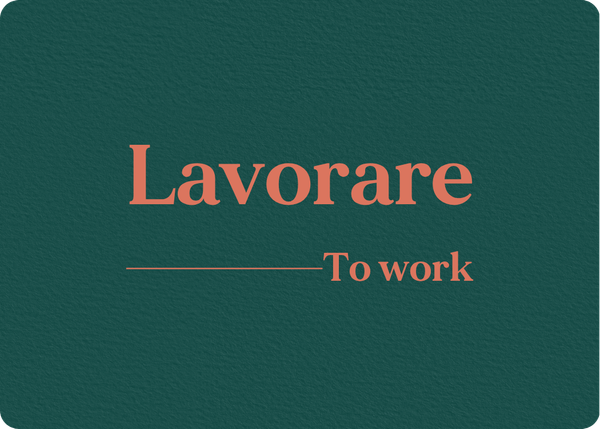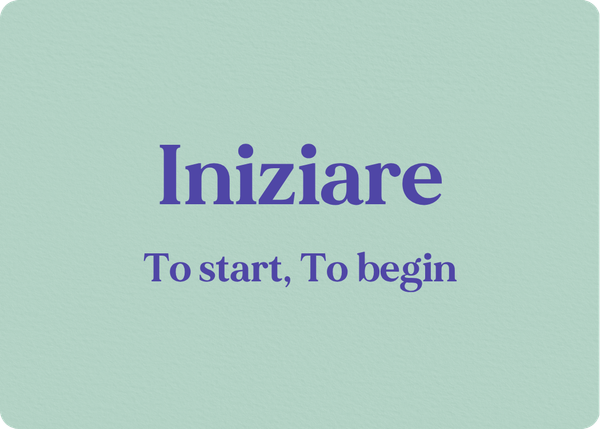What is Lavorare?
Lavorare is an Italian verb meaning "to work" ,"to labor" , or "to be employed". It belongs to the first conjugation (-ARE verbs) and follows regular conjugation patterns. This verb is useful for expressing employment, professional activities, and effort in Italian conversation and writing.
Key Features of Lavorare:
- Type: Regular first conjugation verb (-ARE)
- Meaning: To work, to labor, to be employed, to function
- Auxiliary verb: Uses "avere" (to have) for conjugation in compound tenses
- Past participle: Lavorato
Indicativo – Indicative Mood
Presente (Present Tense)
| Person | Conjugation |
|---|---|
| io | lavoro |
| tu | lavori |
| lui/lei | lavora |
| noi | lavoriamo |
| voi | lavorate |
| loro | lavorano |
Example:
Lavoro in un ufficio nel centro della città.
I work in an office in the city center.
Passato Prossimo (Present Perfect)
| Person | Conjugation |
|---|---|
| io | ho lavorato |
| tu | hai lavorato |
| lui/lei | ha lavorato |
| noi | abbiamo lavorato |
| voi | avete lavorato |
| loro | hanno lavorato |
Example:
Ieri ho lavorato fino a tardi.
Yesterday I worked until late.
Imperfetto (Imperfect)
| Person | Conjugation |
|---|---|
| io | lavoravo |
| tu | lavoravi |
| lui/lei | lavorava |
| noi | lavoravamo |
| voi | lavoravate |
| loro | lavoravano |
Example:
Quando ero giovane, lavoravo in una fabbrica.
When I was young, I worked in a factory.
Trapassato Prossimo (Past Perfect)
| Person | Conjugation |
|---|---|
| io | avevo lavorato |
| tu | avevi lavorato |
| lui/lei | aveva lavorato |
| noi | avevamo lavorato |
| voi | avevate lavorato |
| loro | avevano lavorato |
Example:
Era stanca perché aveva lavorato ininterrottamente per ore.
She was tired because she had been working nonstop for hours.
Passato Remoto (Simple Past)
| Person | Conjugation |
|---|---|
| io | lavorai |
| tu | lavorasti |
| lui/lei | lavorò |
| noi | lavorammo |
| voi | lavoraste |
| loro | lavorarono |
Example:
Mio nonno lavorò in quell'azienda per quarant'anni.
My grandfather worked in that company for forty years.
Trapassato Remoto (Past Anterior)
| Person | Conjugation |
|---|---|
| io | ebbi lavorato |
| tu | avesti lavorato |
| lui/lei | ebbe lavorato |
| noi | avemmo lavorato |
| voi | aveste lavorato |
| loro | ebbero lavorato |
Example:
Dopo che ebbe lavorato per anni, finalmente ottenne una promozione.
After he had worked for years, he finally got a promotion.
Futuro Semplice (Simple Future)
| Person | Conjugation |
|---|---|
| io | lavorerò |
| tu | lavorerai |
| lui/lei | lavorerà |
| noi | lavoreremo |
| voi | lavorerete |
| loro | lavoreranno |
Example:
L'anno prossimo lavorerai in una nuova azienda?
Will you work in a new company next year?
Futuro Anteriore (Future Perfect)
| Person | Conjugation |
|---|---|
| io | avrò lavorato |
| tu | avrai lavorato |
| lui/lei | avrà lavorato |
| noi | avremo lavorato |
| voi | avrete lavorato |
| loro | avranno lavorato |
Example:
Quando il progetto sarà finito, avremo lavorato insieme per due anni.
When the project is finished, we’ll have worked together for two years.
Congiuntivo – Subjunctive Mood
Presente (Present Subjunctive)
| Person | Conjugation |
|---|---|
| che io | lavori |
| che tu | lavori |
| che lui/lei | lavori |
| che noi | lavoriamo |
| che voi | lavoriate |
| che loro | lavorino |
Example:
Spero che Barbara lavori con passione nel suo nuovo impiego.
I hope that Barbara works with passion in her new job.
Passato (Past Subjunctive)
| Person | Conjugation |
|---|---|
| che io | abbia lavorato |
| che tu | abbia lavorato |
| che lui/lei | abbia lavorato |
| che noi | abbiamo lavorato |
| che voi | abbiate lavorato |
| che loro | abbiano lavorato |
Example:
Credo che Marco abbia lavorato duramente questo mese.
I think that Marco has worked hard this month.
Imperfetto (Imperfect Subjunctive)
| Person | Conjugation |
|---|---|
| che io | lavorassi |
| che tu | lavorassi |
| che lui/lei | lavorasse |
| che noi | lavorassimo |
| che voi | lavoraste |
| che loro | lavorassero |
Example:
Volevano che io lavorassi anche nei weekend.
They wanted me to work on weekends too.
Trapassato (Past Perfect Subjunctive)
| Person | Conjugation |
|---|---|
| che io | avessi lavorato |
| che tu | avessi lavorato |
| che lui/lei | avesse lavorato |
| che noi | avessimo lavorato |
| che voi | aveste lavorato |
| che loro | avessero lavorato |
Example:
Non sapevo che Andrea avesse lavorato in quella ditta.
I didn't know that Andrea had worked in that company.
Condizionale – Conditional Mood
Presente (Present Conditional)
| Person | Conjugation |
|---|---|
| io | lavorerei |
| tu | lavoreresti |
| lui/lei | lavorerebbe |
| noi | lavoreremmo |
| voi | lavorereste |
| loro | lavorerebbero |
Example:
Lavoreresti meglio in un ambiente più tranquillo.
You would work better in a quieter environment.
Passato (Past Conditional)
| Person | Conjugation |
|---|---|
| io | avrei lavorato |
| tu | avresti lavorato |
| lui/lei | avrebbe lavorato |
| noi | avremmo lavorato |
| voi | avreste lavorato |
| loro | avrebbero lavorato |
Example:
Avrei lavorato con più entusiasmo se il progetto fosse stato più interessante.
I would have worked with more enthusiasm if the project had been more interesting.
Imperativo (Imperative)
| Person | Conjugation |
|---|---|
| (tu) | lavora |
| (lui/lei) | lavori |
| (noi) | lavoriamo |
| (voi) | lavorate |
| (loro) | lavorino |
Example:
Lavora sodo e raggiungerai i tuoi obiettivi!
Work hard and you'll reach your goals!
Indefinite Moods
Infinito (Infinitive)
- Presente (Present): lavorare (to work)
- Passato (Past): avere lavorato (to have worked)
Examples:
Mi piace lavorare in team.
I like working in a team.
Dopo aver(e) lavorato tutto il giorno, era molto stanco.
After working all day, he was very tired.
Participio (Participle)
- Passato (Past): lavorato (worked) - also used as adjective
Example:
Anna ha comprato un anello lavorato in argento.
Anna bought a crafted silver ring.
Gerundio (Gerund)
- Presente (Present): lavorando (working)
- Passato (Past): avendo lavorato (having worked)
Examples:
Lavorando insieme, risolveremo ogni problema.
By working together, we'll solve every problem.
Avendo lavorato per anni nel settore, conosce tutti i segreti del mestiere.
Having worked for years in the field, he knows all the secrets of the trade.
The verb Lavorare at a glance: Key tenses you need
| Present | Present Perfect | Imperfect | Present Subjunctive | Imperfect Subjunctive | Present Conditional |
|---|---|---|---|---|---|
| io lavoro | io ho lavorato | io lavoravo | che io lavori | che io lavorassi | io lavorerei |
| tu lavori | tu hai lavorato | tu lavoravi | che tu lavori | che tu lavorassi | tu lavoreresti |
| lui/lei lavora | lui/lei ha lavorato | lui/lei lavorava | che lui/lei lavori | che lui/lei lavorasse | lui/lei lavorerebbe |
| noi lavoriamo | noi abbiamo lavorato | noi lavoravamo | che noi lavoriamo | che noi lavorassimo | noi lavoreremmo |
| voi lavorate | voi avete lavorato | voi lavoravate | che voi lavoriate | che voi lavoraste | voi lavorereste |
| loro lavorano | loro hanno lavorato | loro lavoravano | che loro lavorino | che loro lavorassero | loro lavorerebbero |
Conclusion
Mastering the conjugation of "lavorare" is essential for expressing employment, professional activities, and effort in Italian. As a regular first conjugation verb, it follows standard patterns throughout all tenses.
Remember the key points:
- Uses "avere" as auxiliary verb in compound tenses
- Regular first conjugation verb (-ARE) with standard patterns throughout all tenses
- Past participle is "lavorato"
- Essential for expressing employment, careers, and professional endeavors
- Featured in many useful expressions related to work and business
Keep practicing with real sentences and contextual examples to master this Italian verb!





